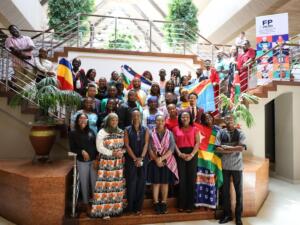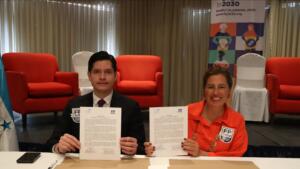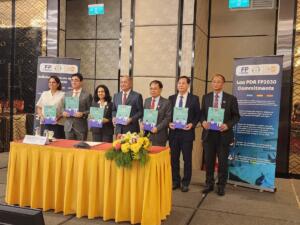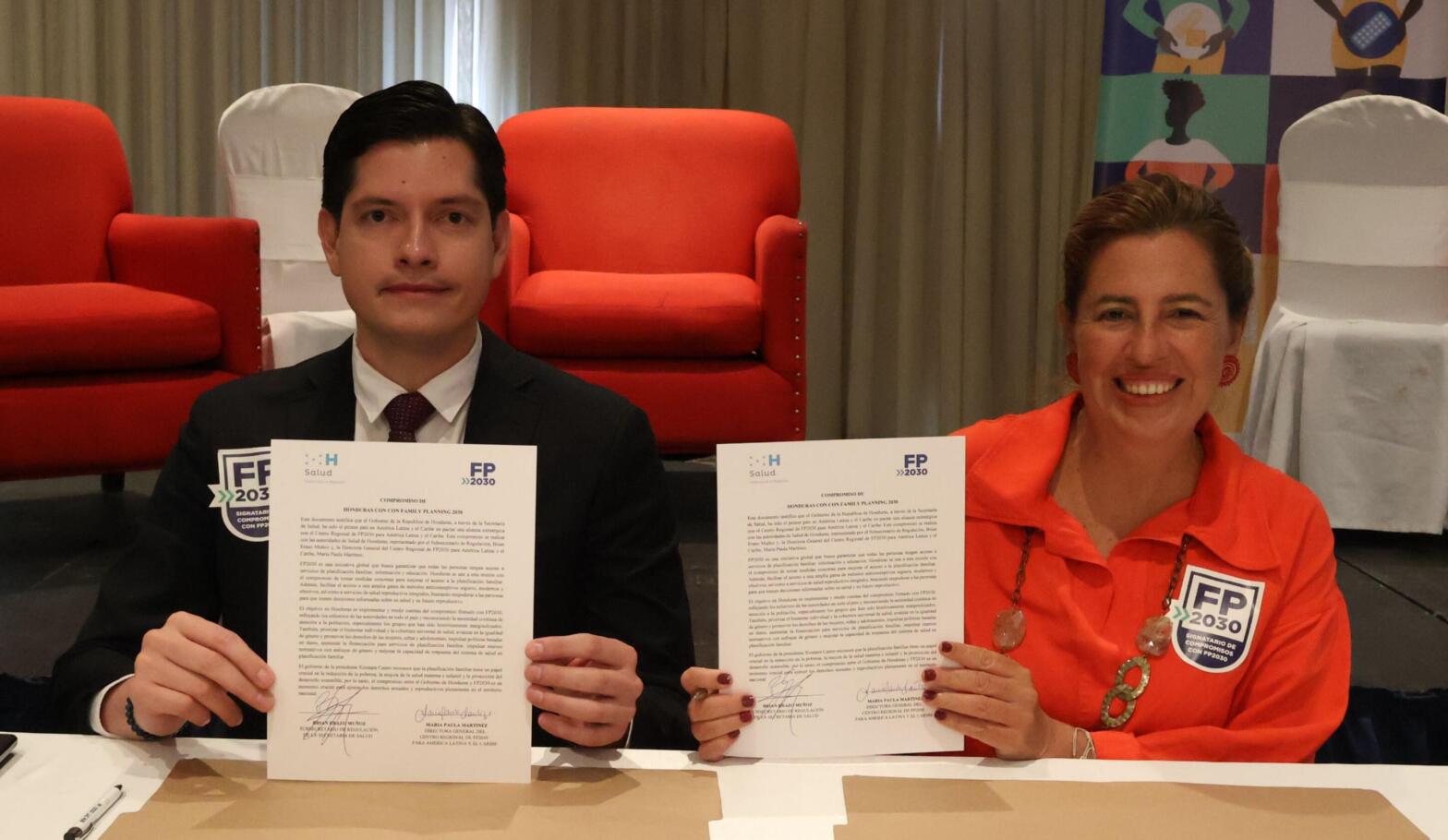Dear colleagues,
I’m writing to you at the tail end of an exceptional month for FP2030.
First, we’re proud to share that Honduras is officially the first-ever country in the Latin America region to make an FP2030 commitment. This is a monumental occasion as FP2020 was only open to 69 focus countries — the countries with the lowest income at the time of the partnership’s launch, which excluded the majority of Latin America. This represents a new era for Honduras, for the region, and of course for our partnership.
Next, just last week FP2030 launched it’s annual measurement report, Meeting the Moment: Family Planning and Gender Equality. We are proud to share this new data with the community, and we’re encouraged by signs of progress – like rising modern contraceptive prevalence rates in Africa. We also see warning signs of what could be ahead: stagnant funding, political fights, and a growing anti-rights agenda. The release of this report as well as the first commitment from a new region show the crossroads we find ourselves in: if we double down on a human rights agenda, revitalize leadership and renew funding efforts, our potential is nearly limitless. If we throw our hands up in despair at the challenges ahead, the consequences seem limitless as well.
First and foremost, our movement for human rights, particularly the right to control our fertility, will need new energy – so we’re pleased to announce the launch of our new strategy on adolescents and youth. This strategy, available now in English and French, details how and why young people remain a priority for FP2030 – not only as recipients and beneficiaries of family planning programs, but as partners with knowledge in how to shape this movement.
Internally, this month was also a milestone moment for FP2030. For the first time, all five managing directors across all regional hubs were able to meet together in person at the North America and Europe Hub to plan our work and chart our way forward together. FP2030’s localization model is the first of its kind, and it’s incredible to see the fruits of a long decentralization process now fully in action: five regional hubs now entirely staffed, with the tools and expertise they need to advance family planning in their own communities. While the managing directors were here, we were able to have a highly productive meeting with other leaders in the movement for rights-based family planning, to discuss their organizations’ “biggest bets” and whether they have seen them pay off. This movement won’t be won alone, and it’s critical we reach across organizations, across silos, across regions, and across funding streams to make progress together.
Thank you for partnering with us. Onward!
Dr. Samukeliso Dube
FP2030 Executive Director
FP2030 launches global strategy on adolescents and youth
 This month, FP2030 celebrated the launch of a new organizational strategy on adolescents and youth at an event hosted alongside the ICPD+30 Global Youth Dialogue in Cotonou, Benin. The event featured opening remarks from Dr. Martin Migombano. The strategy is now available in English and French, with more resources coming soon.
This month, FP2030 celebrated the launch of a new organizational strategy on adolescents and youth at an event hosted alongside the ICPD+30 Global Youth Dialogue in Cotonou, Benin. The event featured opening remarks from Dr. Martin Migombano. The strategy is now available in English and French, with more resources coming soon.
More on youth: Last week (above), FP2030 Youth Focal Points from 32 countries convened in Accra Ghana for a week-long capacity building workshop focusing on SMART Advocacy training and knowledge management, among other key themes. Stay tuned for more information from the workshop!
From East Africa: Mozambique supports young people with family planning to improve quality of life
Honduras marks first FP2030 commitment from a Latin American country
 The Latin America and Caribbean (LAC) FP2030 Regional Hub is proud to announce a significant milestone: Honduras has emerged as the inaugural signatory country in the Latin American and Caribbean Region. This achievement underscores Honduras’s dedication to advancing family planning initiatives in Central America, marking a pivotal step toward fostering reproductive health, gender equality, and sustainable development in the region. Read more.
The Latin America and Caribbean (LAC) FP2030 Regional Hub is proud to announce a significant milestone: Honduras has emerged as the inaugural signatory country in the Latin American and Caribbean Region. This achievement underscores Honduras’s dedication to advancing family planning initiatives in Central America, marking a pivotal step toward fostering reproductive health, gender equality, and sustainable development in the region. Read more.
FP2030 launches annual measurement report: Meeting the Moment: Family Planning and Gender Equality
Until women are able to decide for themselves what happens to their own bodies, gender equality will remain an unreachable dream. Access to contraception is the critical factor that unlocks a world of possibilities for women and girls: finishing school, pursuing a career, planning for and starting healthy families, and participating fully as equal members of society. Voluntary, rights-based family planning is essential for progress on gender equality.
That’s why the links between family planning and gender equality are the central theme of this year’s Measurement Report. Our data set covers 85 countries, including for the first time Botswana and Namibia, two middle-income countries that have now made commitments to FP2030, and Jordan, which has moved into the lower-middle income category. The report also reflects the impact of the decentralized FP2030 Global Support Network, with input from all five Regional Hubs: Asia and Pacific; East and Southern Africa; North, West, and Central Africa; and Latin America and the Caribbean.
Read the measurement report now. You can also read the narrative companion to the measurement report, the partnership report. Together, these reports are referred to as the FP2030 Progress Report.
 “By providing comprehensive information and a variety of contraceptives, African countries are empowering individuals to make choices that align with their reproductive goals. This reduction in unmet need translates to healthier families and communities.”
“By providing comprehensive information and a variety of contraceptives, African countries are empowering individuals to make choices that align with their reproductive goals. This reduction in unmet need translates to healthier families and communities.”
Hear more from Dr. Sheila Macharia, Managing Director, FP2030 East and Southern Africa Regional Hub, and Dr. Martin Migombano in Business & Financial Times (B&FT).
Lao PDR Launches Commitment to Advance Family Planning Rights, Choices, and Services
 Congratulations LaosPDR! Lao PDR is reaffirming its commitment to the unfinished ICPD agenda to improve access to adolescent and youth-responsive health systems for contraceptive use, ensure the availability of quality and safe youth-friendly services and family planning information and services to reduce the unmet need for family planning among adolescents and young people aged 15–24 years, among other goals. Learn more.
Congratulations LaosPDR! Lao PDR is reaffirming its commitment to the unfinished ICPD agenda to improve access to adolescent and youth-responsive health systems for contraceptive use, ensure the availability of quality and safe youth-friendly services and family planning information and services to reduce the unmet need for family planning among adolescents and young people aged 15–24 years, among other goals. Learn more.
More on Lao PDR: Choice, Availability: Leaders Champion Universal Access to Family Planning in Laos in Laotian Times.
In Other News
The vibrant city of Bogotá, Colombia made history as the first Latin American host city for the seventh International Conference on Family Planning (ICFP), scheduled for 3-6 November 2025. This landmark decision, supported by the William H. Gates Sr. Institute for Population and Reproductive Health, the Government of Colombia, Profamilia, and Fundación Valle del Lili as co-hosts, marks a significant milestone for Latin America and the global family planning community. At FP2030, we’re thrilled to amplify the work of Latin American family planning advocates, young people, governments, and more on the road to ICFP 2025.
From FP2030 on LinkedIn: Tailoring Family Planning Efforts: FP2030 Asia and the Pacific Hub Quarterly Meeting Takeaways.
Reflections from Oslo: FP2030 East and Southern Africa Regional Hub Managing Director, Dr. Sheila Macharia, attended the 8th International Parliamentarians Conference, #IPCI2024 on the implementation of the #ICPD.
Measurement report coverage from CITE-Zimbabwe: Africa registers highest increase in contraception use, new FP2030 report, and from Taarifa: Global Report Reveals Advances in Family Planning and Gender Equality.
A360 has released their inaugural reflection report for 2023, spotlighting major project achievements and championing the voices of adolescent girls across Ethiopia, Kenya and Nigeria. In its second phase, A360 has achieved remarkable engagement, reaching over 974,000 first-time users and 424,000 continuing users of modern contraceptives. Institutionalization and sustainable scale up into government systems in Ethiopia and northern Nigeria have been particularly successful.
The Insights 101 Playbook from Breakthrough ACTION is an introductory guide to one of the key building blocks of dynamic social and behavior change project design: insights. The playbook includes three chapters corresponding to the three different insight phases: (1) identifying and articulating insights; (2) converting an insight into an opportunity; and (3) sharing and applying insights.
